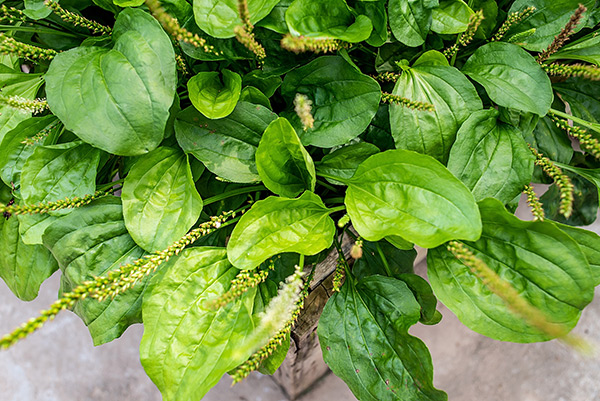Can a plantain from Asia keep liver disease at bay?
05/04/2021 / By Evangelyn Rodriguez

Plantago asiatica, also known as Chinese plantain, is a useful plant that belongs to the plantain or fleawort (Plantaginaceae) family. It is native to East Asia, where it’s widely used as a folk medicine for a variety of ailments, such as digestive problems, urinary system inflammation and liver disease.
In Japan, the leaves of Chinese plantain are consumed as a vegetable or used to make an herbal tea, while in China, its seeds are used as a diuretic, antipyretic, antitussive, antiphlogistic (anti-inflammatory) and laxative. Because of its many medicinal properties, Chinese plantain has been widely studied in recent years.
According to several reports, Chinese plantain extracts have shown utility in preventing diabetic complications. Its essential oils have also shown cholesterol-lowering properties in animal studies. Meanwhile, Chinese plantain seeds have been reported to have antihypertensive effects. They also contain polysaccharides that could reduce lipid absorption by modulating the gut microbiota.
In a recent study, researchers at Nanchang University in China further explored the medicinal uses of Chinese plantain. Using animals with lipopolysaccharide (LPS)-induced liver injury, they examined the anti-inflammatory properties of this traditional Chinese medicine (TCM) and found that it offers substantial benefits for the liver.
The researchers reported their findings in an article published in the Journal of Medicinal Food.
Chinese plantain seeds contain phytonutrients that prevent inflammation-related liver damage
According to previous studies, Chinese plantain seeds are rich in bioactive components, such as polysaccharides, phenylethanoid glycosides, iridoids, flavonoids and triterpenes. The polysaccharides, in particular, have been shown to promote the maturation of murine dendritic cells (antigen-presenting cells), induce defecation and exhibit antioxidant activity in vitro. However, the activity of these phytonutrients against liver injury has not been thoroughly explored.

To address this, the researchers pretreated mice with different doses of Chinese plantain polysaccharides for three weeks. On Day 22, they gave the animals intraperitoneal injections of LPS, an endotoxin found in the outer membranes of Gram-negative bacteria, then took blood and liver samples after 12 hours.
The researchers found that the Chinese plantain polysaccharides inhibited the excessive production of pro-inflammatory signaling proteins, such as tumor necrosis factor-a (TNF-a), interleukin (IL)-6, IL-10, IL-2, and IL-1B in the LPS-exposed mice. They also improved the activity of the antioxidant enzyme, glutathione peroxidase, as well as the total antioxidant capacity in the mice’s livers.
In addition, the Chinese plantain polysaccharides inhibited the expression of the free radical, nitric oxide, and the enzymes, inducible nitric oxide synthase (iNOS) and cyclooxygenase-2 (COX-2), which are involved in free radical production. The polysaccharides also increased the production of metallothioneins, which are proteins capable of scavenging free radicals, in the mice’s livers.
Based on these findings, the researchers concluded that Chinese plantain seed polysaccharides have protective effects against inflammation that causes liver injury. (Related: Poor man’s ginseng found to protect against liver damage.)
Natural ways to prevent liver disease
Liver inflammation, also known as hepatitis, can be triggered by many things, such as viral infections (hepatitis A-E), alcohol abuse (alcoholic hepatitis), autoimmune disease or excessive fat accumulation, which leads to non-alcoholic fatty liver disease (NAFLD), or fatty liver. If hepatitis is not controlled early on, it can cause extensive liver damage, loss of liver function and chronic liver disease.
Fortunately, most liver diseases are preventable. Here are some things you can do to keep your liver healthy without using medications:
- Maintain a healthy weight
- Eat a well-balanced diet
- Exercise regularly
- Avoid toxins from aerosol products, cleaning products, pesticides and chemical additives
- Use alcohol responsibly (or avoid it altogether)
- Avoid using prescription-type psychotherapeutics (e.g., pain relievers, tranquilizers, stimulants and sedatives)
- Practice safe sex
- Practice proper hygiene at all times
Persistent inflammation is linked to the development of serious diseases, including chronic liver disease. But adopting an anti-inflammatory diet, which consists of fruits, veggies, whole grains, nuts and fish, managing your weight and taking herbal medicines like Chinese plantain can help protect your liver from damage and prevent different kinds of liver disease.
Learn more about plants that help fight chronic diseases at PlantMedicine.news.
Sources include:
Tagged Under: alternative medicine, amphibian research, anti-inflammatory, Chinese plantain, herbal medicine, Herbs, inflammation, liver damage, liver health, natural cures, natural medicine, phytonutrients, plant medicine, remedies, research




















